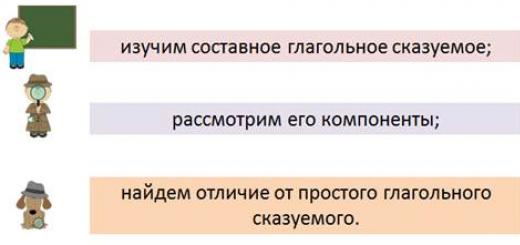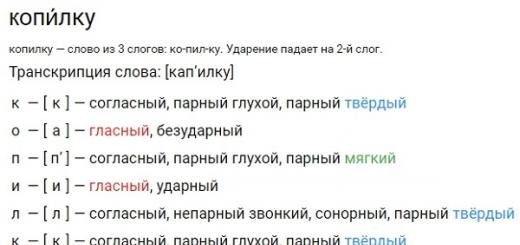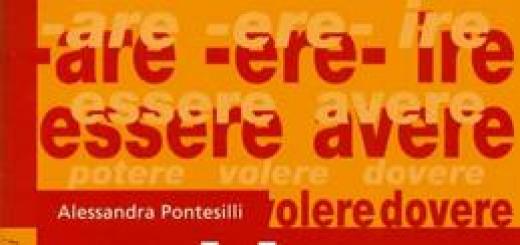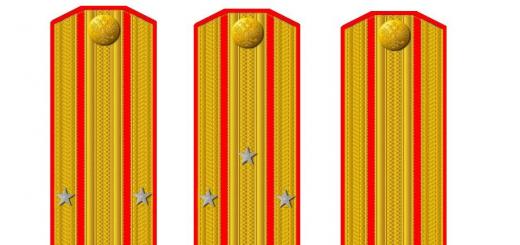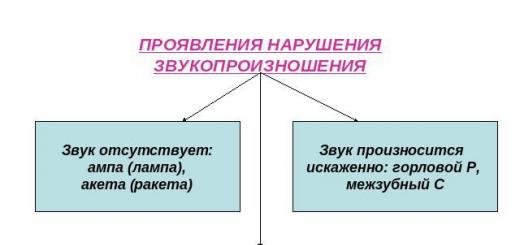The purpose of the lesson is to get acquainted with the compound verbal predicate; find out how it can be expressed.
Topic: Two-part sentences. Main members of the proposal
Lesson: Compound Verb Predicate
Compound predicates- these are predicates in which the lexical meaning and grammatical meaning (tense and mood) are expressed in different words. The lexical meaning is expressed in the main part, and the grammatical meaning (tense, mood, etc.) is expressed in the auxiliary part.
A compound verb predicate consists of two parts:
A. auxiliary part(verb in conjugated form) expresses grammatical meaning (tense, mood, etc.);
b. main part(indefinite form of the verb - infinitive) expresses lexical meaning.
Compound verb predicate = auxiliary verb + infinitive
I started singing; I want to sing; I'm afraid to sing.
Scheme for constructing a compound verbal predicate.
But not every combination of a conjugated verb with an infinitive is a compound verbal predicate! In order for such a combination to be a compound verbal predicate, it must be fulfilled two conditions:
1. The auxiliary verb must be lexically incomplete, that is, it alone (without an infinitive) is not enough to understand what is being said in the sentence.
I started - what to do?; I want - what should I do?
Don't be confused! A compound verbal predicate with a combination of a predicate and an infinitive, which in a sentence is a circumstance of the goal!
She sat down (for what purpose?) to rest.
2.The action of the infinitive must relate to the subject.
I want to sing. I want to sing- compound verbal predicate (I want - I, I will sing - I).
Don't be confused! If the action of the infinitive refers to another member of the sentence, then the infinitive is not part of the predicate, but is a minor member.
I asked her to sing. Requested- simple verbal predicate, sing- addition (I asked, she will sing).
3. The table shows the main auxiliary verbs, as well as short adjectives and an example of a phraseological unit that can be included in a compound verbal predicate.
|
Basic auxiliary verbs |
Short adjectives as auxiliary verbs | Phraseological combinations | ||
| Beginning, end, continuation of action | Desirability, possibility, necessity of action | Emotional assessment of action | ||
|
finish get started continue stop |
try |
like hope be afraid to be ashamed prepare |
For example: (he) is eager to (participate) |
|
I can sing. I want to sing. I like singing. He began to prepare to leave. He continued to prepare to leave. He gave up smoking.
Plan for parsing a compound verbal predicate
1. Indicate the type of predicate.
2. Indicate how the main part is expressed; what is the meaning of the auxiliary part and what form of the verb is it expressed.
Sample parsing
The old man started chewing again.
Started to chew- compound verb predicate. Main part ( chew) is expressed by the infinitive. Auxiliary part ( set off) has the meaning of the beginning of an action and is expressed by a verb in the past tense of the indicative mood.
1. Textbook: Russian language: textbook for 8th grade. general education institutions / T.A. Ladyzhenskaya, M.T. Baranov, L.A. Trostentsova and others - M.: Education, OJSC "Moscow Textbooks", 2008.
1. Simple sentences (a collection of material on the topic of the lesson) ().
2. Federal Center for Information and Educational Resources ().
3. Unified collection of digital educational resources ().
4. Vinogradov V.V. Basic questions of syntax (based on the Russian language) ().
5. Russian philological portal ().
6. Presentations “Predicates” ().
1. Highlight the grammatical bases of the sentences.
Don't let your soul be lazy!
So as not to pound water in a mortar,
The soul must work
And day and night, and day and night!
Don't let her sleep in bed
By the light of the morning star,
Keep the lazy girl in the black body
And don’t take the reins off her!
If you decide to cut her some slack,
Freeing from work,
She's the last shirt
He will rip you off without mercy.
She is a slave and a queen,
She is a worker and a daughter,
She must work
And day and night, and day and night!
N. Zabolotsky
2. Interesting things about Russian.
Interesting questions:
1. What letters can be used to make delicious food?
2. Which day of the week has a double consonant in its name?
3. Which words contain three letters? e?
4. What words begin with four consonants?
5. What letter must be written into the boy’s name so that it turns into the name of wooden pointed poles?
6. What words are written in contract 3 letters e?
A compound verbal predicate has two parts: auxiliary and main. The main part always consists of an infinitive, expressing the main information in the semantics of the predicate. The auxiliary part carries a double load: it expresses the modal-temporal meaning of the predicate and complements the main informative meaning.
The lexical meaning of the auxiliary part includes:
- An indication of the beginning, end, continuation of an action: begin, become, end, stay, continue, stop, cease, etc. Such verbs are called phase and form a special lexical-semantic group, as a result of which they acquire a grammatical meaning: You have already begun to fade a little ( Yesenin);
wipe your face and lift the strap of your cap (Konetsky);
Before a thunderstorm, the fish stopped biting (Paustovsky).
- An indication of the necessity, desirability and possibility of action: can, want, desire, intend, decide, assume, count, etc. Such verbs are called modal. Like phase verbs, modal verbs also express grammatical knowledge: Without personal labor a person cannot go
Oh, if only I could hate you (Pushkin); I don't want to forget
and I can’t (Svetlov).
The difference between a simple and a compound verbal predicate is especially pronounced when compared. Wed: The reader sees and understands what he wants and can see and understand.
In the main sentence, all components of the semantics of the predicate are expressed by conjugated verbal forms sees and understands; in the subordinate clause, the modal-temporal component of semantics is expressed by the auxiliary verbs wants and can, complementing with their lexical meanings the main meaning of the predicates, expressed by infinitives.
The infinitive included in the compound verbal predicate is called “subjective”, since it denotes the action of the same person as the auxiliary part: I wanted to say, I can bet, I like to talk, etc.
The infinitive fulfills the need of phase, modal and emotional verbs in the object, therefore the infinitive, which is part of the predicate, can alternate in speech with a noun that acts as a complement. Wed: I want to go forward and with everyone
during the day, every hour I want something new, but he wants to stop and stop me with him (L. Tolstoy); It's not death that I'm afraid of. Oh no! I'm afraid to disappear completely (Lermontov); I loved the noise of the forest, the smell of moss and grass, the diversity of flowers, the thickets of swamps that excite the hunter, the cracking of the wings of a wild bird, gunfire, creeping gunpowder smoke; loved to search and unexpectedly find (Green).
Depending on the syntactic conditions and lexical-semantic meanings of auxiliary verbs in the infinitive, either verbal or nominal properties are strengthened. Phase and modal verbs are less vivid and independent than emotional ones, therefore combinations with verbs containing an emotional assessment of an action do not have an unambiguous interpretation in the literature and are considered either as a predicate or as a combination of predicates with additions.
It is necessary to distinguish combinations from a compound verbal predicate that include an infinitive, which plays the role of a complement and an adverbial adverb.
The infinitive, which plays the role of a complement, is called “objective”, since it denotes the action of another person (not the “subject” of the conjugated verb form): advised to search, asked to take care, etc.: Antonenko ordered people to leave the barge (Konetsky);
The battalion commander was ordered to take the height (Lvov) that day; Not
I will allow you to speak badly about life in my presence, for
The auxiliary part includes:
- a linking verb to be, expressing only modal-temporal meanings. In the present tense there is usually no copula (“zero copula”): Work for the benefit of society is sacred
key to knowledge (Proverb); Personal happiness is impossible without
the happiness of others (Chernyshevsky); The morning was hazy, the sky
dim (Vigdorova); Life is empty and colorless only
among colorless people... (Chernyshevsky); Peace is the greatest key value of our existence, without which we lose meaning
and the strength of all other blessings and joys of life (Leonov);
- Linking verbs, not only expressing modal-temporal meanings, but also introducing various additional shades, sometimes very significant, into the lexical meaning of the predicate: do, become, become, appear, be considered, seem, be called, etc.: It’s winter here. Everything becomes brighter, more cheerful
Ivan Ivanovich... (Dubov); The glare of the sun seemed like diamonds
(Akhmatova); Throughout world history, a new culture has always been a synthesis of the new with the old, with the basic
the beginnings of the culture that it replaced (Bryusov); Regardless of all these tragic internal experiences, Blok, in all periods of his work, remained a true poet and a true artist (Bryusov);
- verbs with the meaning of movement, displacement, position in space and time with varying degrees of weakening of the lexical meaning: come, come, return, step on, stand, sit, lie, etc.: Autumn has come, rainy, cold (Vigdorova); She came out of the pool fresh, cold and fragrant, covered with trembling drops of water (Kuprin); A letter from Vienna (Danin) lay open on his desk.
Both auxiliary verbs and linking verbs can function in speech as simple verbal predicates with the preservation of lexical meanings. For example: There was fresh shade on the terrace (L. Tolstoy); Was
dark, autumn, rainy, windy night (L. Tolstoy); Trees
stood in the snow - two days ago there was a strong snowstorm (Proskurin);
At the place where the flotilla recently stood, an ice wave was walking (P a u -
Stovsky). It is easy to notice that in verbal forms capable of serving the grammatical side of compound nominal predicates, one of the components of semantics is the meaning of being-existence, which is supplemented by other, specific meanings. The component of being determines the interchangeability of such verbs (cf.: stood in the snow - were in the snow, a wave was walking - there was a wave, etc.).
Only a change in word order in sentences with the verb to be, which has the most abstract meaning of being, causes a redistribution of syntactic functions. Wed: The shade on the terrace was fresh; It was night
dark, autumn, rainy, windy; The trees were covered in snow - two days ago there was a strong snowstorm; At the place where the flotilla had recently stood there was an icy wave. A change in word order entails significant changes in the syntactic functions of some word forms, more subtle differences in grammatical meanings with insignificant differences in lexical semantics (the adverbial place on the terrace is transformed into an adverbial definition, the definition fresh becomes a nominal part of the predicate, etc.).
The main ways of expressing the nominal part of the predicate are the adjective in the full and short form (and the long form begins to crowd out the short form), the noun and the short passive participle. In addition, the nominal part can be expressed by prepositional-case combinations, whole phrases, phraseological units, etc.
Let's supplement the above examples with the following: I spent the evenings with people in Bratsk. Shiryu's comrades are rich in soul. Conversations
warm-hearted, smart, good. These people are friendly, their home is cozy (Bezymensky); Houses are more durable than people and witness several human generations (Paustovsky); The sail is old, bleached by rains, with_ large square patches (Yakovshikh trees (Sokolov-Mikitov); He was a jack of all trades (Dubov).
In interrogative sentences, the nominal part of the predicate can be expressed by a pronoun or a combination of pronouns: Who
This? What is this? Who is Ivanov? What is art?
What is the weather today? What is the result of our work? etc.
Notes: 1. In some cases, short and long forms of adjectives diverge in lexical meanings (The girl is very good and The Girl is very good), in valence properties (Life is rich in events and Life is rich), etc. Therefore, not in all cases short forms can be replaced by complete ones and vice versa: Here in our area, rich in songs, The girls are too pretty (Fatyanov); ...In any case, life is
us rich! (Koptyaeva).
2. A compound nominal predicate may include particles: With this pain, I feel younger (Yesenin); She was like a song to me (Yesenin); Night
seems paler today (Yesenin); The surest sign of truth is simplicity and clarity (L. Tolstoy); The wolf is not a shepherd (Proverb).
Compound predicates- these are predicates in which the lexical meaning and grammatical meaning (tense and mood) are expressed in different words. The lexical meaning is expressed in the main part, and the grammatical meaning (tense and mood) is expressed in the auxiliary part.
Wed: He started singing(PGS). - He started to sing(GHS); He was sick for two months(PGS). - He was sick for two months(SIS).
Compound Verbal Predicate (CVS) consists of two parts:
A) auxiliary part(verb in conjugated form) expresses grammatical meaning (tense and mood);
b) main part(indefinite form of the verb - infinitive) expresses lexical meaning.
SGS = auxiliary verb + infinitive
For example: I started singing; I want to sing ; I'm afraid to sing.
However, not every combination of a conjugated verb with an infinitive is a compound verbal predicate! In order for such a combination to be a compound verbal predicate, two conditions must be met:
The auxiliary verb must be lexically incomplete, that is, it alone (without an infinitive) is not enough to understand what the sentence is about.
Wed: I began- what to do?; I want- what to do?.
If in the combination “verb + infinitive” the verb is significant, then it alone is a simple verbal predicate, and the infinitive is a minor member of the sentence.
Wed: She sat down (for what purpose?) relax .
The action of the infinitive must relate to the subject (it is a subjective infinitive). If the action of the infinitive refers to another member of the sentence (objective infinitive), then the infinitive is not part of the predicate, but is a minor member.
Wed:
1.
I want to sing . I want to sing- compound verbal predicate (want - I, sing will- I ).
2.
I asked her to sing. Requested- simple verbal predicate, sing- addition (I asked, she will sing).
Auxiliary verb meanings
| Meaning | Typical verbs and phraseological units | Examples |
|---|---|---|
| 1. Phase (beginning, continuation, end of action) | start, become, start, continue, finish, stay, stop, quit, stop and etc. |
He began to prepare to leave. |
| 2. Modal meaning (necessity, desirability, ability, predisposition, emotional assessment of an action, etc.) | Can, be able to, wish, want, dream, intend, refuse, try, strive, count, be able to, contrive, strive, assume, get used to, hurry, be embarrassed, endure, love, hate, be afraid, be afraid, be cowardly, be ashamed, set a goal , to burn with desire, to have the honor, to have the intention, to make a promise, to have the habit and etc. |
I can sing . |
Plan for parsing a compound verbal predicate
- Indicate the type of predicate.
- Indicate how the main part is expressed (subjective infinitive); what meaning does the auxiliary part have (phase, modal) and what form of the verb is it expressed.
Sample parsing
The old man started chewing again.
Started to chew- compound verb predicate. Main part ( chew) is expressed by a subjective infinitive. Auxiliary part ( set off) has a phase meaning and is expressed by a verb in the past tense of the indicative mood.
Predicate along with the subject, it is an element of the grammatical basis of the sentence. The predicate denotes the action that the subject performs, as well as its state or attribute, therefore, the predicate answers questions what to do? what to do? what happens to the item? what is the subject? what is he? who is he? As a rule, the predicate is expressed by a verb, but there are other ways of expressing it - noun, adjective, pronoun, participle, etc.
The predicate of the Russian language is represented by three types - simple verbal predicate, compound verb and compound nominal. In order to quickly and correctly determine the type of predicate in a particular case, it is necessary, firstly, to present a diagram of the composition of the predicate, and secondly, to be able to apply the theoretical scheme to specific linguistic material. Let's look at the types of predicates, briefly describe each of them and follow the implementation with an example.
1. Simple verb predicate.
This is the simplest type of predicate - it is expressed by a verb in some mood. For example, he plays; would have come earlier etc. Most often, this type is remembered using the formula: one word in the predicate, which means the predicate is a simple verb. It is not difficult to guess that this formula is erroneous: this type includes predicates that contain 2, 3 or even more words. For example:
He will for a long time recall about the past(future complex).
Let stars forever illuminate your long, long winter journey(imperative mood).
He lost his temper (phraseologism).
They waited, waited And didn't wait (repetition of one verb in different forms).
Spring waited, waited nature(repetition of the same verb forms).
Don't be offended, but it will still be in my opinion(repetition of one verb with the particle not).
I'll go for a walk (a combination of different verbs in the same form).
2. Compound verb predicate.
This predicate is built according to the scheme: auxiliary verb + infinitive. All these elements must be present in the predicate so that we can call it a compound verb! Again, you should not think that this predicate consists of 2 components - there may be more.
He wants to enroll in the Institute.
I'm long could not with them meet.
You must study.
He was looking to have fun.
I was unable to think about it.
Note that phase verbs (those that denote the phase of action) most often act as auxiliary elements - start, continue, become, quit) or modal words ( must, must, wants).
3. Compound nominal predicate.
Such a predicate consists of a linking verb and a nominal part. The most common linking verb be, but you can also find other connections. The nominal part is expressed as an adjective. Noun, adverb, participle, pronoun, etc.
Weather was good.
The book is true Friend.
He has character harder become.
Grass beveled.
Evening quiet.
Error was obvious.
Two by two - four.
This notebook my.
As you can see, determining the type of predicate is not a difficult task; you just need to confidently and completely know the material and, most importantly, be able to navigate it.
website, when copying material in full or in part, a link to the source is required.

